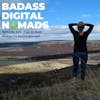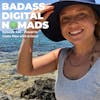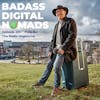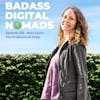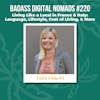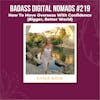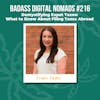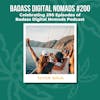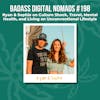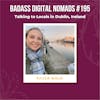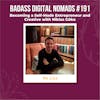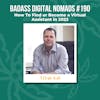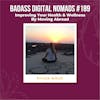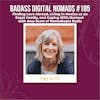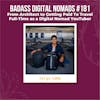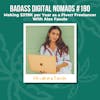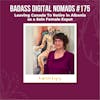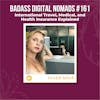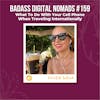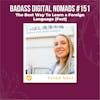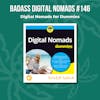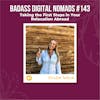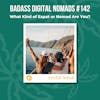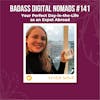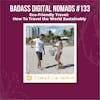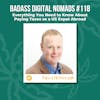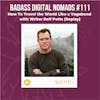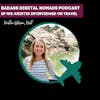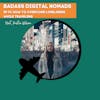Inside the Real Bangkok, Thailand with Erick Prince, Minority Nomad (Part 2)
Get ready to depart Thailand and explore the world in Part 2 of Kristin's interview with Erick, the Minority Nomad. Erick shares his favorite travel destinations on each continent after visiting 95 countries. Plus, Erick and Kristin discuss loneliness, finding yourself abroad, and the dark sides of traveling.
Get ready to depart from Thailand and explore the world in Part 2 of Kristin's interview with Erick, the Minority Nomad.
Erick reveals his favorite travel destinations on each continent. After visiting 95 countries, he shares the place he'd recommend to you the most for exploring, adventure, learning, and nightlife.
Kristin and Erick also discuss how to best cope with loneliness, burnout, and the dark sides of traveling.
They contemplate the difference between who you are at home versus the person you become while traveling abroad. And, (as usual), much more!
EPISODE 108 TOPICS DISCUSSED:
- How to find your community abroad (even if you're an introvert) and overcome loneliness while traveling.
- Erick's favorite countries in the world and why.
- The difference between your identity at home and the other "you" that emerges through international travel.
- The gentrification of digital nomad hotspots like Georgia, Lisbon, Bali, and Thailand.
- The dark side of the travel and tourism industry and how it could have impacted the late Anthony Bourdain.
- Why traveling abroad is safer for Black men than living in the U.S.
QUOTES:
- I believe most friendships are friendships by proximity and convenience.
- The people we meet through travel are the people who make us who we truly are.
- When you go abroad, you don’t have those shackles [of society] on you anymore.
- I enjoy being wrong. It’s exciting to me because that means I’m learning.
- There’s a difference between traveling and content creation.
- Photography is my outlet for how I see the world. And it’s not always f*king fuchsia.
RESOURCES
Featured Product: Remote Health Insurance by SafetyWing - International health insurance for expats, digital nomads, and remote workers (including US and Canadian citizens). Get 5% off your first year of Remote Health! Activate discount on checkout page.
Related Content:
- Listen to Part 1 of Erick's Interview
- Podcasts:
- Video: Living in Japan as an American Abroad (what it’s like)
- YouTube Channel: Eva Zu Beck
Erick's Favorite Countries:
- Europe:
- Romania and Transylvania
- Ukraine
- Germany
- Spain
- Latin America:
- Honduras
- Chile (Atacama and Patagonia)
- India
- Delhi
- Mumbai
- Taj Mahal
- Kerala Region
- Africa
- South Africa
- Morocco
- Egypt
- Middle East:
- Uzbekistan
- Georgia
- Azerbaijan
- Asia:
- Japan
- Cambodia
- Laos
- Thailand
- Vietnam
Other Resources Mentioned:
- Anthony Bourdain Parts Unknown
- Netflix Formula 1 Series
- Netflix Audrey Hepburn Documentary
- Disney's The Jungle Book
Connect with Erick, the Minority Nomad:
Connect with Kristin:
- Follow on Instagram
- Subscribe to Traveling with Kristin on YouTube
- Subscribe to Digital Nomad TV on YouTube
- Follow on Medium
- Follow on Clubhouse @KristinWilson
- Join the Badass Digital Nomads Facebook Group
...........................................................................................
Support the Badass Digital Nomads Podcast:
- Buy Me a Coffee
- Become a Patron
- Leave a 5* Review: https://lovethepodcast.com/digitalnomad
- Buy Official Merch
- Search All Episodes: www.badassdigitalnomads.com
Thank you to Magus63 for leaving the following review:
I follow Kristin on every social network and her content has been of great help to open my way through the digital nomad world. Particularly her podcast is my everyday companion to commute to work. She always has up-to-date and quality content. Recently I also reached out to her, she was very nice and very helpful in solving my doubts. Thank you very much Kristin for your efforts, from a soon-to-be digital nomad from Argentina.
...........................................................................................
Thank you to my 2021 Patrons: Teklordz, Trader Walt, Shawn, Gary, Gary R, Yozhik, Bronwyn, Cynthia, Erick, Yasmine, Mike, Isaac, Michael, Scott, Karen, Erik, Heather, Craig, RZ, Timothy, Richard, Fred, Lakshay, Yohji, Annie, Ray, Ron, Henry, Kelly, Alejandra, Keith, Stephen, Eddy, Warren, and James!
Become a Patron for $5/month at Patreon.com/travelingwithkristin
...........................................................................................
Podcast descriptions may contain affiliate links of products and services we use and recommend at no additional cost to you.
Sneak Peek:
Erick: 00:00:00 Oh, well, God, I love having this conversation because it reminds me of what everything that I love, again about exploring the world and I'm traveling and interacting, it's like these are, these are the things that we should be discussing as humans now.
Kristin: 00:00:14 Yeah, Let's do that.
Erick: 00:00:14 Let's do that.
Introduction: Welcome to Badass Digital Nomads, where we're pushing the boundaries of remote work and travel, all while staying grounded with a little bit of old school philosophy, self-development, and business advice from our guests.
SafetyWing
Kristin: 00:00:35 Did you know that SafetyWing now offers comprehensive global healthcare for digital nomads, remote workers and expats, no matter where you travel or move to? It's even for people who have returned home and have no home country coverage, including Americans and Canadians living in the US and Canada. This is not emergency travel medical insurance. This is truly global health insurance, remote health policies with coverage of up to $1 million per year, and 175 plus different countries start as low as $153 per month. There are also premium add-ons available, like dental and outpatient procedures. Learn more about remote health or purchase a policy today using the link in the show notes or by going to travelingwithKristin.com/health. That's travelingwithKristin.com/H E A L T H.
Kristin Wilson, Host: 00:01:40 Hi everyone. Kristin from Traveling with Kristin here, and welcome to episode 108 of Badass Digital Nomads. This is part two of my conversation with Erick Prince, the minority nomad. So if you haven't heard part one yet, then drop what you're doing and go listen to that. It's such a great episode, Erick. So profound. But you're going to love this episode just as much. It's actually quite different from part one. Erick gives us a list of his favorite countries in the world and why the best for adventure, the best for learning partying. I've put all of them in the show notes, so if you wanna reference any of them, go check that out. Erick's been to almost 100 countries, so he really knows his stuff. We're also talking about loneliness today, about finding your community abroad, about the difference between who you are at home versus the real you, who you are when you're traveling.
Kristin: 00:02:43 And also a little bit about the dark side of travel. We're talking about Anthony Bourdain, travel burnout, why traveling abroad is safer for black men than living in the US. The negative impacts of the tourism industry and travel content creation, and also the gentrification of new hotspots like Georgia, Lisbon, Bali, and more. We've got a great show for you today, and thank you to Magus63 from Argentina who left a review on Podchaser, and they say, I follow Kristin on every social network, and her content has been of great help to open my way through the digital nomad world. Recently. I reached out to her. She was very nice and very helpful in solving my doubts. Thank you very much, Kristin, for your efforts from a soon to be digital nomad from Argentina. Thank you everyone for your reviews. And just a note to anyone who might still be waiting for a response from me on social media and some emails, we just experienced an exponential increase in correspondence basically overnight. We're still trying to catch up, but really appreciate your patience on that, on with the show.
Podcast Interview:
Kristin: 00:04:06 I know that both you and I have struggled with, I don't wanna say struggled, but we've been vocal about the struggles of feeling lonely On the road which is a bit of a facade because you can feel lonely in any phase of your life. In any location in your life. It's just that I think living abroad and traveling gives you space to sit with that loneliness and look at it more objectively and curiously. And meeting people and having these interactions with them on the road for me has filled that void in a way or it's not even really a void. It's like we don't have the traditional friendships that people have that stay in their hometown forever, but we can recreate them.
Erick: 00:04:58 I hate to cut you off because I have a specific theory about this. I believe that most friendships are friendships by proximity. In convenience. I was like, man, I, if I didn't grow up next door to you, I would hate you as a person. Like, I wouldn't even be friends with you. And when you're on the road, I believe everything's intensified. So I, I use a rule of three. If I've known somebody for one day, I've known them for three days. If I've known them for three days, I've known them for three weeks. If I've known 'em for three weeks, three months, three months, three weeks,
Kristin: 00:05:30 Yeah. Yeah.
Erick: 00:05:31 It's those friends, those relationships become equitable to, so three months is three years in real lifetime. Right. Because if you travel with somebody, you're seeing them 24/7, you're seeing them at their best in their worst, happiest in their saddest. And when you're at home, you rarely see that. How often do you see somebody? 24 hours a day, even when you're married, even when you live with that person, if you have children, children, they go to school. If you have a spouse, they go to work. If you have good friends, you see 'em maybe at happy hour. You do not spend that much time with people. And when you are traveling, when you're abroad, you spend significantly more time with these individuals and you have an opportunity to get to know them. Not only do do you get to know them, you get to know the real of them because they don't have those same shackles on.
Erick: 00:06:21 So as a black man, I post it on Instagram that I was going to a drag show, which I do once or twice a week. Some of my closest friends are drag performers, and I always get ads if I'm gay. And at this point it gets on my nerves. Like, so I just, I let people assume whatever they wanna assume. And it's frustrating because if you are a, a African American man that has friends who are gay, you're assumed to just be gay. And within our community, that's a problem. Still to this day, no matter how progressive people pretend things are back home in the black community, homosexuality is still a problem. It just is. And a lot of black men in particular are, that's one of the worst things that you could say about us. We're raised that way. And, and when you go abroad, you don't have that, that shackle on you.
Erick: 00:07:18 You can interact with anybody that you want. You, I can go be a ballerina tomorrow. Nobody's gonna talk. Nobody's gonna look at me different. If I don't wanna go to church. Nobody's gonna look at me crazy, say, Hey, I want to go meditate on a rooftop in India, but you're Catholic. So the people that you meet abroad and you interact with and you spend time with, you're actually getting to know them. The people back home, and, and this isn't everybody, but there's always a, there's this field up. There's invisible offense. Like, oh, is she going to judge me? She's gonna look at me different. Do I, well, I lose my friend. It like, I'm polyamorous. I don't believe in monogamous relationships. I'm polyamorous. If back home, if I told that to some women, she'd be like, oh, well, you just a player. You just wanna sleep with all women. You want. Like, well, no, that's not what that means. But uh, right. But abroad, you can find that community. And even though it does exist back home, but you're, you don't have that fear of being that authentic version of who you are, which is why so many people have these amazing experiences overseas because they're not afraid to try things and to see different things. Right. And interact with different people and to say whatever they want to say.
Kristin: 00:08:29 Yeah. You don't have that filter or self-consciousness about what other people are gonna think because no one around knows you <laugh>. Exactly. So when you meet people, you're meeting them for the first time, and you're meeting each other where you are in that moment, whether it's sitting in a circle on the beach or, or wherever. And then nobody back home knows where you are or what you're doing either. And so it actually can take, I think, think it took me a few years before I really, really felt like I dropped all of that and just experience that innate freedom where it feels kind of like you're living closer to the, the fabric of quantum reality, like quantum physics, where everything is random and the outcome happens in that moment. It's like everything collapses. Like there's infinite number of options of what's going to happen. And you choose one, and then everything collides and drops into that one path.
Kristin: 00:09:31 And you get to pick your path throughout the day. So when you were saying that story about, you know, inviting people to come and sit next to you, first of all, everything slows down. You start to be aware of your surroundings, and then there's no pretense. And you can just say, say to a stranger, Hey, what's up? And other people are in that same vibe because they're also probably outside of their hometown. So one time I was in Hong Kong by myself, traveling around Southeast Asia. It was in like Hong Kong --Macau. And I was just exploring along the harbor front. And, um, this girl asked me, I think either one of us asked each other to take a picture. 'cause you know, with the, the ships and the harbor and Hong Kong, it's like those kind of pirate looking ships. And it's just so stunning with the skyline there.
Kristin: 00:10:19 And she was from Germany. And we just start talking like, we each take a picture of each other and then we just stand on the rail in the harbor and just start talking. We stood there for probably two hours. And then she's like, what are you doing right now? I'm like, nothing. Like just walk, like walking around exploring the city. And we just went on this full day of exploration, like 12 hours. We ended up in the night markets and Kowloon and I had never saw her again, but we spent the whole day together just exploring Hong Kong. We're still friends on social media. She just got engaged or married and she's back in Germany. But she gave me travel tips when I was living in Japan. 'cause she spent a lot of time in Japan. And it's just, it's kind of hard to explain these tangents that you go on in life. But that for me makes it worth the trade off of maybe not having as many of those traditional friendships, but having way more intense interactions with people where by the end of that 12 hours, I felt like we were childhood friends who just hadn't seen each other in 10 years. Right. And then we ran into each other on the sidewalk
Erick: 00:11:30 And it lasts forever. Yeah. I cannot tell you how many people that I've had those experiences with, I'll go to their hometown do, I'll be passing through and they say, Hey, just come over here, stay here a couple days, and we pick up right where we left off. And it's like you become that, that respite from the norm. Like you become, they like, you're, you're the--
Kristin: 00:11:53 They associate you with this like, escape.
Erick: 00:11:55 That's the best time of their life. You know, that that's, it's like, Erick, I can't believe you're still doing this. I'm like, me either, man. Like so many times, you know, my friends, they're married and with kids and, you know, settling down with company and it's like, those are the people who they never question why you're still doing what you're doing because they understand why.
Kristin: 00:12:15 Yeah
Erick: 00:12:15 Because they did it with you. They were there. Yeah. Like they, they, they, they know the story. They know all the stories, you know, like, Hey, you remember that time? Oh yeah, of course I remember <laugh>. Like, it's those people. I think those are the people who make us who we truly are. This is one issue that I've had with a lot of societies is they constantly tell children who they are. And these people that we meet abroad, they don't tell us who we are. They learn who we are. They help us find who we are, but they don't tell us who we are. Know our school systems, tell us who we are, our religious structures tell us who we are. Like our parents and our friends and our family. They tell us who we are. But those people you need abroad. No. They let you become who you are. They let you decide. It's a big, very big -- And that's why those relationships are so powerful.
Kristin: 00:13:10 Exactly. They just reflect, hold the space for you to be who you are without any judgment.
Erick: 00:13:18 They give you aspects of personality, like just worldview that you never had before. I remember I was sitting, uh, I had a conversation with a girl in Malaysia. She was from LA uh, she had to be maybe 22. And I'm, I'm a bit older. Uh, I think I've gotta be maybe 32, 33. And it seemed like she had never interacted with somebody to question her worldview. Like she was absolutely baffled that I went against basically everything that she, she said, I wasn't trying to convince her of anything. I just didn't agree with anything that she said. And I, you know, we argue, we went back and forth and, you know, years later we still kind of catch up here and there. And she always said like, oh man, I couldn't said, I, I could not believe you came at me like that. I was like, <laugh>.
Erick: 00:14:05 Like, but you know me now. She's like, yeah, now I know you makes sense. But back then, I couldn't believe it. It definitely definitely changed the way I think about things. And, and for me, that's probably the biggest compliment that I could get is when somebody says, oh, you made me think. It made me think differently because I go through my entire day trying to find ways to think differently. I was like, all right, somebody destroy my worldview right now. Please. 'cause I want <laugh>. I I want to know something. And I think one of the reasons that my work has become what it is now, I'm so curious. I enjoy being wrong. It's exciting to me because that means I'm learning and I'm growing. Those are where you find the lessons. That's why I love Asia so much, much is because it's, it's a region and continent that's built on mastery.
Erick: 00:14:57 People still respect mastery of a thing. Where he's been making sushi for 50 years, like this one sushi for 50 years. Like she's been making this same noodle for 40 years. Like they master things here. And there's so many people to just learn from here. So many people to interact with. And the hospitality of teaching here is just so freely given and it inspires me to give. So like if you look at my website or you've never seen me sell anything, I've never sold a course or mentorship or any, any of those things because I think it should be free. I think this stuff should be free. It's only a matter of survival that I do what I do for a living. 'cause otherwise I'd do it for free. <laugh>. Like, I just love it.
Kristin: 00:15:50 Well, I think that's what we're moving towards is a, a society where those who choose can live through their art. And you've proven that with learning photography as a child. Maybe we can talk about that story, how you came into photography and then abandoning it basically. Or putting it on hold while you were in the military and then coming back to it, and then living for the past decade from that photography and turning it into all these different types of ways to make a living. But still, you're living in your passion and working in your passion, but it's not in a cliche way. It's just in a very authentic, natural way where you're receiving value in exchange for the value that you're providing the world. And it's just, that's the natural way that I think it's supposed to be. And I think that's why one of the reasons why you see that in other people.
Kristin: 00:16:42 For example, this photo that you had on Instagram of a man who had been making chai tea for 40 years, to think about all the nuances of making that cup of tea. It's like we get frustrated if we can't learn something in one day or one hour. And this man's been making this tea for 40 years. And I had the same experience in Japan where I went to a green tea ceremony. And I talked about this in a video I made about what it was like living in Japan as a foreigner. And I had that epiphany of, I asked the girl, oh, when did you learn how to do this? And she said, I'm still learning. What are you talking about <laugh>? Like, not, she didn't say it that way. Yeah. Yeah. Because she's Japanese. So she was very respectful. She was just very demure and just said, oh no, you know, I, I do not know how to make tea.
Kristin: 00:17:30 Like this will be a lifelong thing. Yeah. And that I'll still never learn. But that apprenticeship mentality, that's natural. You know, hundreds of years ago the welder was teaching the little kid how to weld or how to blow glass or whatever. This, this relationship has been lost in the institutional education system. So it's really refreshing to see you doing that. And then has photography, has this become a portal for you to interact with the locals? Because one of the big things that people talk about in the expat community or location, independent, what have you, is people always talk about getting involved with the local community. But it's almost like lip service in a way. 'cause I don't think anyone really knows what that means and like what that looks like. So can you give us some insight into your friend circle and what is the mix of foreigners, of short-term foreigners, you know, expats versus immigrants versus locals, and how can other people integrate naturally and give back to the communities that they're living in abroad without just living like a tourist everywhere?
Erick: 00:18:47 Right. You know, so I think for me, I'm blessed. I'm, I'm a pretty big black guy with a nice smile <laugh>. And I'm just naturally an outgoing person. I'm an introverted extrovert.
Kristin: Me too.
Erick: I tend to like to be by myself, but I love people as well. You know, you put me in this situation, I'll be blessed to thrive. It's just how I'm built because I'm, I'm, I'm curious and I, I have almost no fear because I'm a bigger guy. I can take care of myself. People tend not to mess with me in that way. And people tend to receive me kindly because I'm black. So one of the good things about how American, uh, media representation has going around the world is everybody knows who Barack Obama is and LeBron James and Will Smith and Michael Jackson. So you show up with these things. Oh, Tiger Woods, like, y'all love Tiger Woods. Right? Everybody tells me I look like Steve Harvey. Wait,
Kristin: 00:19:39 Just 'cause you're black. They're like, oh, you look like a black.
Erick: 00:19:42 I look like this black guy. I've been giving Steve Harvey, Will Smith, Chris Tucker. Everybody says, I, I talk like Chris Tucker. I get Chris Tucker a lot. Like, you sound like the, the funny guy with Jackie Chan in Asia. Everybody thinks I'm Chris Tucker.
Kristin: 00:19:55 Oh, I could kind of hear that.
Erick: 00:19:56 That's the entry for me. So, and I'm speaking specifically about Asia now, being a black man in Asia is the greatest gateway into every culture here, because there's so few of us, and they've consumed so much of our media over the years that when we show up, there's this, this curiosity. And when you show that you're open, I always tell everybody the, the one language I speak is smile at all times.
Kristin: 00:20:24 It's a universal.
Erick: 00:20:25 Universal language. I love smiling. People say, why are you smiling so much? Like, why don't you smile? That's a better question because I am always, are you always happy? Yes, I am always happy. He was like, no way. You're always happy. Yes. I woke up today, I am happy 100% because that's just how I'm built. And this has given me an opportunity to really dig into these places. I would say in Asia, uh, I was based as a soldier. I was a Korea and Japan as a civilian Malaysia and, um, Malaysia, Indonesia, and, uh, Thailand now, uh, have been my homes with a little bit of time in Vietnam. And every place I've lived, I've built, I've got outta my way to ensure that my friend circle is mainly locals. And it's because they know all the cool shit that I wanna know. And I get in trouble here at Thailand.
Erick: 00:21:15 I've got a lot of my, a lot of my close friends are black. And one of my good friends, her name is Tori Rogers. She runs a, uh, a Facebook page Facebook group called Ebony Expats. And what Ebony Expats is, is basically a group of, of black expats here in, in Thailand. And she always invites me to the events. And I told her, I was like, you know, I have a quota. I can only be around two and a half black people at a time. <laugh>. And it is like a rutted joke between us. You know, it's not true. I I go to the events sometimes. But it's, I go out of my way to ensure that I'm with locals. I'm with Thai people. It be the Thai American or Thai who never left Thailand. I want to immerse myself in the, in the culture so I can truly understand the place that I live that I call home.
Erick: 00:22:02 Now, I date Thai women. My close personal friends are Thai, my lawyer is Thai, my doctor. She's half Thai. I go out of my way to be in this environment. I learned Thai, I have survival Thai intentionally mispronounce words so I can be corrected. So it breaks that ice. So people know, oh, he lives here and he's making an effort to learn our language, to understand our culture. Because there's a issue here that within the digital nomad community that we don't speak about is there's a level of arrogance and entitlement and privilege within our community that's absolutely disgusting. And it makes me sick anywhere I see it. And Thailand's a great place for that. And Indonesia, I left Indonesia because it was so disgusting near the level of arrogance and privilege that the community had. So I do not wanna be associated with that in any way.
Erick: 00:22:59 And I go outta my way to ensure that if you see Erick, it's likely you're gonna see me by myself or with the local. And, and, and if anybody is wondering how do they authentically immerse themselves in the community, let the community tell you what it needs. Let the community tell you what they need from you or what they want you to do. And most of 'em are gonna say, just be kind, be respectful, learn. We don't need you to build a clinic. We don't need you to help us and save us. We don't need you to give us extra money on the bill. But we need you to be respectful of us, our culture, our history, and spend the time to learn and educate yourself. Be humble. One of my lessons to anybody who emails me or reaches out to me and asks me about living abroad is always remember that you are a guest in someone else's home.
Erick: 00:23:54 Act accordingly behave the way you would expect a guest who's in your home. So you don't come in my house putting your feet up on my furniture, making a mess. You don't come in my home going in a refrigerator like it's yours. You don't show up to a party empty handed. You don't come in my house telling me my politics are wrong. And the way I choose to live my life is wrong. You can leave if you're gonna do those things. So if you truly want to integrate in a community, if you really want to be considered a local-ish, you have to put in the effort. And I think that's where a lot of people come up short, because there's this whole volunteerism movement where volunteering and helping has been commoditized into social credit.
Kristin: 00:24:39 Yeah. And I think you also have to put in the time, because it's really difficult to integrate and get to know people if you're only there temporarily. And especially if you're working. So if you take away the hours that you're working during the day, and then also sightseeing if you're in a new place and you wanna see that place. But then once you start to get into the deeper layers of the place you've, you know, been to the temples, you've seen the sites that comes with time spent there. And the longer you're there, the more onion layers you peel back. One of the concerns that I have based on 2020, so on the one hand, I think both of us agree that the more people who are traveling and living abroad, the better because this unspeakable thing happens where your eyes just get opened to who you are, what the world is like.
Kristin: 00:25:34 Just things start to open up when you get to travel and live abroad beyond going on a one week cruise somewhere, or, you know, going to spring break. But something that I've become concerned with, depending on how much this lifestyle blows up and accelerates, is this effect that I've seen in Tulum where everyone picks a place based on what's trending on Instagram. And then it's like, if, if everybody from New York and Miami and LA and California and Kansas City are all flying down to Tulum, it just becomes like a little expat bubble bubble. Where the expat population far outnumbers the local population. And you can't walk a block down the street without running into 500 people from the US. And so that kind of starts to, first of all, it's not sustainable for that economy and the, the development and there's usually no zoning and things like that. And things just go too fast. But then also it really takes away from the organic experience of travel because you've just basically created an expat compound in a new destination. And so this is why I really encourage people to ignore the hotspot of like the best places to go and just go where you feel called to go. It's almost like the less Americans there, the better. Which is kind of hypocritical because we are US citizens.
Erick: 00:27:02 Well, I don't think we're hypocritical in that. I think because you and I have traveled enough, we've seen it before. We've seen it in Chiang Mai. We saw it in Lisbon. Like we, we've seen this, uh, around the world before. Um, right now it's Georgia. It's happening in Georgia.
Kristin: 00:27:18 Portugal is definitely gonna be a problem.
Erick: 00:27:21 Right. Portugal is, oh God, it's high up there. And you know, these things come and there's nothing--
Kristin: Bali.
Erick: 00:27:26 Oh God. Bali. I, I'm shocked how that's maintained for over a decade. That, that place has been saturated like that. But you know, you, you get one of two things that will happen. The locals will clam down on it or people would just get bored. And it, it's, and you know, those people get exposed eventually. They don't last, they just don't last, um, the destination. You just don't go there. Or these people, they'll go home because they're not built for that life abroad. Anybody who decides to live basically in a commune, let 'em stay in that commune. Keep everything else open for us. You know. Um, I've always had this dislike for Chiang Mai's digital nomad community for that exact reason that you brought up. But Thailand's a very big country. There's plenty of other places for me to go.
Kristin: 00:28:15 That's what I thought when I got there. I was like, why is everyone here? Like, there's lots of other comparable places.
Erick: 00:28:22 Yep. Phai, we just super close. Chiang Rai. Full of amazing places, but let 'em stay there. I was like, okay. I know where you guys are at. Perfect. I know where not to go. Thank you very much.
Kristin: 00:28:34 Yeah. And in a big city like Bangkok, you can find your tribe there.
Erick: Oh yeah.
Kristin: And that's really hard to do in Canggu. Yeah. Tiny. You gotta get out of the bubble.
Erick: Tiny.
Kristin: And in some of the other places that you love and that you kept going back to, I know after you get to 95, a hundred countries there's a lot of places that you've been to multiple times and researching you and stalking you, <laugh> I found that some of the places that you liked were, were Turkey, like Istanbul. Where you went early on Romania, Laviv, Chile, uh, Honduras. Uh, what are some of the, the things that you liked about those places and why have you continued to, oh, India. India. Why have you gone there so many times and you know, continue to promote it to other people?
Erick: 00:29:24 So I think a place like, um, Romania, I love Romania because Romania was one of the biggest culture shocks for me. Uh, uh, like I did not expect pe people to be so welcoming. And I, like today, I'm a Romanian godfather now. Like I have have a Romanian gods son. Like my best friend is Romanian. And we met on a rooftop in Piatra Neamt, North of Romania taking pictures like I was picking on him yesterday. <laugh>. Like, it's one of those life things that just happens. Going to Transylvania and, and, and just learning about what Transylvania really is and who the people really are as opposed to what you've been presented. It became such a special place in my heart. The love of my life was Romanian. So it was just one of those places that just has a special personal connection to me.
Erick: 00:30:14 A place like Turkey, it's one of the most underrated places in the world. And a lot of people go there. It was like, it, it does not receive a fraction of the praise. It should because of western media representation of terrorism, of abuse, of it being scary in some places. I'm like, man, you guys are missing out places like India, India's, it's a place you don't vacation. I tell everybody, you never vacation in India. You experience India. India is a place where you experience humanity. There's no better place on the planet. I have been where you experience more about the human condition than you do in India.
Kristin: 00:30:49 That's what I hear
Erick: 00:30:50 You understand everything about the, the greatness about the, the, the disgustingness, about the, the greed, about the generosity, about the beauty, about the pain of humanity. It's all in India and it'll take you about two days, <laugh> to see all of those things. <laugh> to experience all of those things.
Kristin: 00:31:11 What would you recommend for people going there the first time? Which corner?
Erick: Where? In India?
Kristin: North India or Southwest India. Yeah.
Erick: 00:31:18 Ooh. I, I'd say you, you, you have to go to India and you have to do the, the typical places. Right. You gotta see Taj, you gotta go to Delhi. You got, and I'm not even saying, I'm not saying that just to dis some like Mumbai, like to, to downplay 'em. 'cause they're all fantastic. But I was shocked by how amazing Southern India is just, they call it God's country. It is, Southern India is as good as people say it is. I was avoiding it. The Kerala region. In Tamil Nadu. I was avoiding it because so many blogger colleagues and friends of mine had been going and engraving about it. I was like, Ugh, bloggers. And then I went to the backwaters on the houseboat. It was one of the best trips I've had in my entire life. Easily top 10, easily top 10 travel experiences was visiting Southern India.
Kristin: Wow.
Erick: Or I wasn't. We were there for 11 days. 11, 12 days. I believe. It was fantastic. And actually, I can hit you with one for each continent.
Kristin: 00:32:17 Yeah, let's do that.
Erick: Let's do that.
Kristin: I've only been to 60 countries and, uh, only a lot of them were concentrated in the same regions. So yeah. Hit me with your top.
Erick: 00:32:26 Let's go with continent. Let's say a country that you're gonna have a lot of fun in and a country you're gonna learn a lot in. So let's go with North America, the US and honestly, people are weird when I say this. The US is one of the easily the top five travel destinations in the world. It it, it's a amazing place. There's not a place, uh, in the world with more of a diverse list of offerings than the United States of America. So the United States--
Kristin: 00:32:55 Yeah. You got everything. Every climate. Every scenic backdrop.
Erick: 00:33:00 Exactly. Food, every cuisine, every city type is there. The place, uh, that you're gonna learn the most. Mexico, Mexico is a fantastic place. And please stay outta Oaxaca. Everybody. Please stay outta Oaxaca. Acapulco, it's --Please just dig a little deeper. Dig A Mexico City. Amazing place.
Kristin: I love Mexico City.
Erick: Let's see. South America. I'm gonna hit you with Chile as the place here. No, no, no, no, no. Argentina is gonna be the-- Oh God. No, no. That's tough. No, no, no, no. Brazil is gonna be the place. You're gonna have the most fun and you're gonna learn the most in Chile. North to south Chile is probably the most naturally beautiful place in the world.
Kristin: 00:33:42 I have not been there yet.
Erick: 00:33:43 Atacama up north. Patagonia in the south. It is stunning. Turas Lagos -- a beach in Lemuy, Chiloé. Oh God. It's amazing. Chile is amazing. So go to Chile and learn. Go to Brazil to party. African continent. I would say South Africa as uh, like you're gonna have a blast to South Africa, but go to Morocco. Like you're gonna so much in Morocco and Egypt. Morocco and Egypt and Europe. Let's go with fun. Germany. And a lot of people are gonna be tripping night for nightlife. Germany for nightlife. Germans. German nightlife is something else. I don't think people give German nightlife credit.
Kristin: 00:34:21 I remember going from Oktober Fest to the after party. I was like, just the fact that there is an after party from Oktober Fest is another level.
Erick: 00:34:32 Like the after party starts at one <laugh> like,
Kristin: 00:34:34 And that's in Munich. Then there's Berlin. Holy shit. Berlin.
Erick: 00:34:39 Amazing. Nightlife in Germany. Amazing. But I would say, I would have to say party goes to Spain. Party goes to Spain. But--
Kristin: 00:34:47 Spain, you can end at like nine or 10 in the morning.
Erick: 00:34:49 Yeah. Barely. But also Spain for learning. I think Spain, uh, a lot of people do love Spain. A lot of people go to Spain. It's very popular. But I, I will put Spain up there as far as educational and entertainment. Uh, like as a place, you're gonna have a blast. I mean, you, you go, especially when you get to the south of Spain, when you get to southern Spain, that was, you know, Moorish territory. Oh, Sofia and like, uh, Córdoba, that whole region. Oh, absolutely Fantastic down there in Asia. I'm gonna lump all the Southeast Asia together as far as, uh, for like education. And I'm gonna say for fun, eh, probably still Southeast Asia, but Japan, I think Japan is fun for everyone.
Kristin: 00:35:32 One of my favorite.
Erick: 00:35:33 I think everybody can have a blast if, if, if you enjoy skiing, if you enjoy diving, if you enjoy ama-- the best food in the world. It was something like, I think Tokyo has the most Michelin they do. Tokyo has the most Michelin stars and I think they could lose half of them and still be the number one Michelin star city in the world. Like it's amazing. Like Tokyo. Yeah. I would say Japan. And then you have all of Southeast Asia when it comes to education. Like you learn so much in Southeast Asia that people really didn't know, especially as Americans, when you go to places like Lao and Cambodia and Vietnam and you learn what happened during the war. Um, and then you learn vestiges of colonialism of the French of, uh, Portuguese coming through here. Like people, there's so much stuff people don't know about the opium wars in Malaysia, how Malaysia became what it is. But race relations are like in Malaysia with like the ethnic Malay population and the Chinese and Indian populations there. It's absolutely fantastic. So yeah, that's all the continence, right? I gotta wanna--
Kristin: 00:36:42 I imagine in Vietnam you kind of like, I haven't been there, but it's probably like stepping in behind the scenes of the Ken Burns documentary on the Vietnam War. I, I remember in Budapest, one of my favorite museums I've ever been to in the world is the History museum.
Erick: That was amazing
Kristin: On the Buddha side.
Erick: 00:37:00 Amazing. Of course, it's a original.
Kristin: 00:37:01 I think I spent five hours there. My mom was sitting outside, was so bored.
Erick: 00:37:07 But did you go to all three buildings? A, B and C?
Kristin: 00:37:09 I think I did. 'cause I was there for the whole day.
Erick: 00:37:12 Yeah, It's fantastic.
Kristin: 00:37:13 And just learning about all of the, the religious wars and kind of how that area is almost part of the origins of humanity. I know that homeo sapiens came from Africa, but that part of Europe that's kind of between Europe, Asia, the Middle East and Africa East, it has so much going on. Oh yeah. And so in the Middle East, you've been to the stans.
Erick: Yes.
Kristin: What are some places that, uh, you could recommend in that area? Because I feel like I've been victim to the, the culture war on the Middle East, where being a solo female traveler, I was probably afraid to go there alone. When, meanwhile, now that I know people from there, they're like, oh yeah, you could go. There's so many places you can go by yourself. It's super safe.
Erick: 00:38:01 Uzbekistan.
Kristin: 00:38:02 Uzbekistan. Why there?
Erick: 00:38:04 Uh, Uzbeks. Yeah, Uzbekistan gets it. Um, I think it's because it, I have a special place because that was one of the first places the stans that I went to when I joined the military. And the interaction that I had with people was amazing. This, it was the first time that I really seen people who had never seen a black person before, was in, uh, outside of, uh, it was a place called Karshi-Khanabad Uzbekistan, not too far from Tat, uh, Sumerkan. And, uh, Tajikan, I remember we went on a day trip and it was me and maybe 10 other soldiers. Everybody else was white. And we had two Uzbek interpreters with us. And uh, we had like one security guard guy. And we go into these places and everybody's like, Mike Tyson, Mike Tyson, everybody's yelling, Mike Tyson, Mike Tyson. I'm like, what are they talking about?
Kristin: <laugh> Oh God.
Erick: 00:38:52 And the interpreter goes, yeah, uh, they think you look like Mike Tyson. I'm like, I don't look anything like Mike Tyson, but I was one of the first black people they ever seen in person. And you had to remember, this is, you know, after the Cold War, Mike Tyson was like the most famous black person ever. So they would see his fights, they would see like merchandise and commercials. It was like Mike Tyson and Michael Jackson. I don't think people, people realize how famous those two guys were outside of the United States. Yeah. So it was like, I'm Mike Tyson, I'm a big, I'm a in shape black guy. It was like, so definitely I'm not gonna be Michael Jackson. So I got the Mike Tyson thing, and it was like interacting with people who don't speak my language, who don't look anything like me. And they were so kind and welcoming and you know, you know, I, I hate bringing up race, but when you come from a place where you are home, you are abused.
Erick: 00:39:49 You were really abused. Like my whole life. I, I got beat up by police officers. I was slammed against cars. I was handcuffed with my wrists bled, I was abused by white police officers growing up in the inner city of Cleveland. And then you go overseas and you interact with people who look like that, who don't treat you like shit. They treat you like a guest and a member of the family at times. And it's, it's such a, a shock, you know, to have those preconceived notions of abuse or the fear of being abused, like pushed outta your mind because you finally interact with people that treat you like a human before they treat you like a, a skin color.
Kristin: 00:40:33 Is it healing, that's trauma. That you've suffered there. I is that very cathartic? Do you feel like you're resolving some of the, that it's like a PTSD that is embedded in your brain, you know, these experiences?
Erick: 00:40:49 Well, It's more of a realization that how fucked up the US is. Like it is a, oh oh, this is a us problem. This isn't a world problem, this is a we problem. You know? And I always say like, racism exists everywhere in the world, right? But there's racism with a big R and there's racism with a little r Nobody abroad is trying to shoot me in the back. They're not attacking me. They're not, you know, trying to like, there, there's difference. But would they let me marry their daughter? Eh, probably not. You know, they probably prefer not <laugh>. So, I mean, I'm like, there's levels to this shit. Right?
Kristin: 00:41:29 Yeah.
Erick: 00:41:29 So it's, it's one of those things that it reignites travel, reignites your faith in humanity when your only experience with a lot of humanity has been negative when you grew up in a environment of poverty, of abuse, uh, when you grew up around those people of authority abusing their authority and, and manipulating and controlling you in the way that they see fit. So yeah, I think, uh, to the original question, you definitely have to hit the stans up. I was going back this year. I was supposed to go, I wouldn't even call it a stan. I was going to, uh, Georgia, Azerbaijan, Turkmenistan, Uzbekistan, and um, then Covid hit, um, in 2020. I was supposed to go last year and then, yeah. But, um, as soon as everything opens back up, that's actually gonna be the first region I go back to outside of Asia.
Kristin: 00:42:20 Yeah. Okay. Oh God, my list is getting so long from talking to you, <laugh>. I gotta go. There's so many places. Well, Azerbaijan looks cool, I've been following some of the Formula One stuff. My dad actually has raced cars my whole life. We used to have indie cars in our garage when I was five years old, but I just was watching that Netflix documentary series on Formula One. So I was looking into Azerbaijan. I mean, there's so many places over there that I haven't been to. So do you ever, I'm gonna let you go 'cause I know it's been a long time. But, um, do you ever get tired of traveling? I guess this is a bad question since we haven't been traveling abroad lately. But I, I've, you said something in another interview where they were talking about Anthony Bourdain. That really resonated with me because you said that you could see and other photojournalism friends that you had you could see the tiredness
Erick: 00:43:17 Oh yeah.
Kristin: 00:43:18 in his face. Yes, in his eyes. Because that really was disturb his suicide was very disturbing for many reasons. It was so sad. But one of the things that really stuck, sunk in with me was the place that he chose at, which was Straussberg in France. Like to put myself in that, the mindset that he would've had to be in and like one of the most beautiful places, in my opinion, in the world while he was filming his show. So yeah. What is that that you saw in his face that kind of like jadedness? Yeah. And how can people avoid that or notice the warning signs when you start to lose the magic of traveling and start to really lose your sense of self?
Erick: 00:44:09 This is a fantastic question because it's been something I've been discussing lately, and it is been at the forefront of everything that I'm doing right now. Um, if you look at my social media, if you look at my blog, I, I don't think I've written a blog since last summer. I don't think guilty. I I don't think I--
Kristin: 00:44:29 I had a burnout last summer.
Erick: 00:44:30 Yeah. I, I don't think I've posted a video since, Ugh. A couple a month or two ago. Um, my Instagram, my last Instagram post was like a month ago, but I post on IG stories time. I am done creating content. I am finished creating travel content. What I will do is I will continue to document my, my journeys and my adventures as I see fit as I enjoy. There's a difference between traveling and content creation. We started as travelers. What made Anthony Bourdain so special was he was a traveler. I tell people say, what do you do for a living? Oh, I travel and I talk shit. That's what I do. My job is to travel and talk shit. That's what I do, <laugh>. But then here comes the editors who say, Hey, you can't say fuck anymore, Erick. And it was like, Hey, um, do you wanna, oh, we think that's a little too off the beaten path.
Erick: 00:45:25 How about you stick to these cities that I've been to a million times? Oh, okay. Hey, um, we're gonna take control over this and no, we're gonna, you we're gonna send a videographer with you to tell you what to say. Hey, here's a script. And it all becomes like, wait, wait, what? Why the fuck am I here? Why am I even here? Why is it me here in front of the camera? You can plug in anybody. And it starts to take away the individualness the units of this. And what we see, and a lot of us, and I remember, I would say a few years ago, around 2016, 2017, you saw a lot of YouTubers started to talk about burnout is because you stopped doing it because you love it. You start doing it because you're being paid to do it. And you start to understand the algorithm.
Erick: 00:46:08 You gotta feed the algorithm and you start to feed that what it wants. Oh my God, here's the top five things to do in Bangkok. Woo. Because you know that that's gonna get hits. But you don't talk about this little itty bee qua stand that's down the street from my house that nobody will ever be able to find because I'm not gonna tell you where it is. But when I do, when I create things like that, I'm excited again. I love it. Like tomorrow I'm going to go, there's a place to just open up that sells Chicago hot dogs, that's next to a place called a hundred, A 100 Bit Bar that has these old school video games. And I'm gonna go eat a hot dog. I'm gonna drink a malt shake. I'm gonna play some video games, and that's gonna be my day. Might go see a movie that
Kristin: Sounds awesome
Erick: 00:46:54 Maybe not right but I'm not worried about my next bo-- blog posts. I'm not worried about my next script. I'm just happy. I can't tell you exactly what was going through with Anthony Bourdain's mind. Only he knows that at the moment that he made that choice. But what I saw in his content, what I saw in the way he spoke, he was, he lost faith in what he was doing. He lost that spark, that love of it. It became a job. It was no longer enjoyable. It was a job again. And a lot of us have done that because something that people don't talk about in our career field, we're journalists and we see not only the best of humanity, we see the worst as well. We see the abuses, we see the marginalization, we see the starvation, we see the hunger. We see what our consumerism actually does to people.
Erick: 00:47:45 See these things are hidden in the US and in Canada and in the UK and in Germany they're hidden. But here in Southeast Asia, they're not in places that Anthony Bourdain went. They weren't parts of Africa, parts of Southeast Asia, central and South America. We see these things. So once you get out of that Eurocentric bubble, the world becomes a very harsh place. And when you're constantly in that environment and you're constantly asked to make this cheery bullshit content that's not real, that's not the truth. It wears you down because it destroys your integrity it weighs on your heart and your soul. And you're like the best. One of the best things that happened in my career is Covid. Because for the last two years, I'd say 2018, 2019, I hated my job. I hated it. Like, but I was making so much damn money, so much money in 2018, 2018, 2019. I made more money than I had any, any point in my life. But I was going to the same exact countries doing the exact same things. I was like, oh my God, you should go on Delta Airlines. Check it out. <laugh>. And I'm not knocking that. I'm not knocking it, but for me, it's not what I should have been doing. It wasn't my voice. It wasn't who I set out to be when I started all of this.
Kristin: 00:49:08 Yeah.
Erick: 00:49:09 I think Anthony Bourdain went through the same exact thing. And I think a lot of us go through the same thing is you get everything. You get everything. You, you, we travel the world. We get paid for it. Uh, like, and, and you know, to a certain extent, you're idolized. When people hear what I do for a living, I'm like, oh my God, that's amazing. That's the greatest job ever. And it's like, it's all right. And then you feel like an asshole because you're like, you can see the excitement in their face, you know? And it's like if you only knew like Romania, the treatment of the Roma community AKA, the gypsy community. It's one of the most disgusting and deplorable things I've ever seen in my entire life. And nobody talks about it. And you have these bloggers running around, it's like, I'm the blonde gypsy, shut the fuck up. You know how ridiculous that sounds. As I'm saying--
Kristin: 00:50:02 I saw that in in Bulgaria too. With the gypsy popula. It's like the Rohingya thing. Also exact same thing.
Erick: 00:50:07 Yep. It was like, if, if, if you are running your mouth about Rohingya and you're not saying anything about the Roma community, or you're not saying anything about the, the abuse of Asian peoples or the abuse of African Americans and LGBT-Q people shut up. Just shut up because you're a hypocrite and you're doing it for social clout. And for us, we see these things around the world, and I can tell you this, you go to the most beautiful places and they are built on the back of these local communities who don't have a voice they are built of abuse, of, of, of frustration, of struggle, of, of economic privilege. It's heartbreaking seeing Thai entire Thai communities destroyed, praying that western tourists come back so they can survive when these are some of the most hardworking and talented people I've ever seen in my life. Are praying for some asshole to show up and spend money just to show off
Kristin: 00:51:13 When they could have a, a sustainable, a self-sustaining economy.
Erick: 00:51:18 Exactly.
Kristin: 00:51:19 That's what Covid has shown, that the tourism industry was pretty fucked up <laugh>.
Erick: 00:51:24 Yep. And we knew this. Those of us who work in it, we knew this. We've been saying this for five, six years, this is not sustainable. This is not sustainable. Please stop doing this. Don't go here. People stop going there, locals stop it. But that you can't hear it. The ching ching, ching ching, ching ching, ching, ching.
Kristin: 00:51:46 Yeah. Money talks.
Erick: 00:51:48 And when you see that, and again, Anthony Bourdain saw that. A lot of us see that because it's our jobs to see it. And then we're asked to smile for the cameras. And it's like, oh, this, this place is fantastic except for all the racism. Oh, you guys should really come here. But don't look at all those poor people living in shacks.
Kristin: 00:52:10 I'm really glad you said that.
Erick: 00:52:11 Oh my god, India's so beautiful. But you can't breathe the air like it. It's, I don't know. You know, and for me, what I've committed myself to is I'm still gonna make my same content. I'm a positive cat. I enjoy life, I enjoy the world, I enjoy travel, but I'll make it my way on my terms and what I feel comfortable with. And I'm gonna get back to just going and discovering again. I think when you get into these modes, and for anybody who's listening to this, who's curious about becoming a content creator for a living, or a blogger, vlogger, YouTuber, photographer, whatever, what makes you special is those early couple years where you're stumbling through, you don't know what the hell the algorithms gonna do. <laugh>. You don't know what content's gonna work. You don't know what voice and you're just figuring it out. When you are figuring things out and you're creating your voice, that's who you actually are. So keep an eye on that person, cultivate that person. And by all means, protect that person because that person you are for the first couple years of your career, that's who you want to be when you grow up. Because when you grow up, oh my goodness. The pressures of real life catch up to you very quickly and you're gonna be searching for that person all over again.
Kristin: 00:53:32 Yeah. And that's how you can almost lose yourself in, in the travels. Absolutely. Just a fine line. And I'm really glad that you brought that up because I look back at what I made three years ago when I had no idea what I was doing, and I asked, would I have made that video today or would I have interviewed that person? And that's why I've actually if anybody, I mean, I get emails every day, like a lot of emails, every day of people asking to be on the podcast. And I still look, look at them because like there was this one guy, he was a, like a truck driver who then moved to Guatemala and he just listened to the podcast and he wanted to come on, so I'm gonna have him on because I looked into him, I'm like, his story is super interesting.
Kristin: 00:54:13 Like, I don't care if you're famous or how many followers you have, it's just like, if I see people that I wanna talk to and I think that they're interesting, I'm gonna have them on the podcast. But then, and I don't care if it's like a big name or whatever, but I started to get agitated when I felt pressured to have people on, you know, that kept asking. And I'm like, I don't even wanna talk to this person so that I feel rude, like turning them down. But you have to stay true to yourself, otherwise you're just not gonna like yourself. And and one of the things too is that there's so many people that wanna make that passive income. They wanna retire early, the FIRE system and all that stuff. But I just watched a documentary on Audrey Hepburn and there's like this parallel here with this desire for people to just live off passive income and travel around the world.
Kristin: 00:55:07 It's not about being famous or being rich or whatever. It's about like what you're doing with your life. So like here is somebody who was an icon of her generation. She was the epitome of being a Hollywood star. And she didn't have to work another day in her life. I mean, she decided to quit working to raise her kids and then she could have retired. She was living in Switzerland in this beautiful house. She could have just stayed there in her bubble gardening and like picking apples from the trees and stuff and journaling and cooking. She ended up working, I think it was for unicef and just working like at 18 hour days going around in different countries in Africa during the, um, all of the wars. I think this was in the 1990s. I think I was too young to really know what was going on over there then.
Kristin: 00:55:57 But when there, a lot of people were starving. And she actually grew up, um, in Amsterdam during World War II, and she almost starved to death. So she had that context of what it was like. And she dedicated, she worked every day until she died of cancer for these kids. And she was just beside herself by seeing all of the suffering that was going on and how the, the developed world and the western world just didn't care. But that conviction of even though she had all the money in the world and all the privilege from her career and all of the opportunities, that that's how she decided to spend her life, like doing something that was so important to her. It doesn't matter if she couldn't save every kid that she saw, you know, kids literally died in her arms. Like I can't even imagine what, what she went through.
Kristin: 00:56:51 So it doesn't matter if none of us save the world or fix all of the problems that we see. I think it's just that we're, that we're trying and that we're doing that small part, whatever that looks like, and seeing how that evolves over the, the course of your life, that's where you're gonna get that fulfillment. It's not in, you know, the top 10 beaches to visit in 2021. It's making that content or, you know, doing that thing that you're probably not gonna get recognition for and that you might not even fix. But just like bringing awareness to an issue or just not selling out, I guess. Like, I started making videos like I'm pretty positive person. Like you and I started making videos about like, Why people leave Costa Rica. Like what is the dark side of living there? What do I dislike about the expat lifestyle? What are like the shortcomings? What are the challenges? What are the struggles? And those are the things where I just sit down with no script and I talk about it. And those are the videos that get a half a million or whatever views
Erick: 00:57:56 People--Like the interesting thing, if we had this conversation outside of these microphones, it will be exactly the same. Probably a lot more cursing. And it's like,<laugh>, the, the biggest thing for me is, is just every, what makes you special is who you are. Stop trying to be like everybody else. That's the craziest shit I've ever heard. Like, I remember when the whole Instagram thing was coming up, it's like, oh, you gotta make your entire feed look the same. And I remember this came up on my Instagram, it's like, oh, why don't you have more followers? Right. Because I don't chase that shit. I don't want a million followers on Instagram. I mean, it'd be cool if I had it, but it's like, I'm not willing to play that game because it's not real. See, for me, photography is my expression of my emotions. It's, it's my, it's my outlet. How I see the world, how I understand how life is. And that's not always fucking fuchsia or orange teal or whatever.
Kristin: 00:58:55 Teal and orange <laugh>
Erick: 00:58:56 Brand color you want to create. I try to capture what's in front of me and I try to narrate that or put that image into context of my emotional state at that point. And when you, when you go, come from a position where, hey, this is me on a page or me in a photo or me on video, and you can take it or you can leave it. I think think that comes across a lot better to your audience. Because you look at these videos on YouTube and you're like, oh, one of these again. And they're like, oh man, I don't agree with shit this person has to say. But I like the way they're saying it. You know? And, and that's what resonates with me. That's what inspires me to type a comment or send a, a DM or I'm like, yo, fire video.
Erick: 00:59:42 I disagree with everything you said, but I absolutely love the video. 'cause I could feel that vibe, that energy, passion, you know? And, and I think it comes from passion. Passion is a drug. And people, I'm like, man, you be, you guys chase passion, whatever that is. If you're chasing passion, you're gonna have fun every single day. If you keep chasing that passion, whatever it is, it's just gonna be a blast. And I'm like, if you don't have a passion, chase finding the passion. Just do a whole bunch of cool shit. Like, especially if you're young, I'm like, Hey, this sounds cool. Lemme go try that. Oh, that didn't turn out too well at all, but hey, let's go try the next thing. You know, I think we get to, to the point where we're, we're taught to be afraid to fail. Where it's embarrassing.
Erick: 01:00:28 Yeah. I'm like, yo, man, I fail every single day, every day of my life I try to fail because that's how you learn. That's how you grow. That's how you change. That's how you discover stuff. Like, remember when you were a kid? It is like you just came out of the womb walking. No, you just fell a lot. And how, yeah. Like you sit there and you watch a kid just continuously try to walk and they fall and then they roll over and they get back up and they try it again over and over and over until they get it. And it's like, when do we lose that? When do we,
Kristin: 01:01:00 And those falls get celebrated at the beginning.
Erick: 01:01:03 Yep. They're all good.
Kristin: 01:01:04 And, and then at some point Yeah, it does get lost.
Erick: 01:01:08 Yep. You lose that and you, like, you'll run, you see a baby's just going after a dog and chewing on his ear. Like it's just a fearlessness that we have as children that life beats out of us. And it's not just really life. Yeah. It's our societal structure. It beats that adventure out of us. It's like, yeah, we can't have the, we need drones. You gotta have drones for the machine to work. You gotta have those robots. So we can't have all these free thinking, hippies running around <laugh>, <laugh>. We need somebody in these doctors.
Kristin: 01:01:39 Yeah. I was just, um, at my parents' house, my brother flew in from California and he actually had like a near-death experience snowboarding recently. So that was the first time I saw him since his accident. Which is actually another thing, learning how to ski or snowboard. You'll spend the first few days on your ass <laugh>. And it hurts, but it's worth it.
Erick: 01:02:00 Yeah. I learned, I learned to get a chilling. Yep. <laugh>.
Kristin: 01:02:03 Yeah. But you can't learn how to ski without falling a lot. Yeah. At the beginning. But once you get through that, you're like having a blast. So anyway, he comes over, he brings his my six year old niece, so his daughter and I had to catch myself. We did a lot of arts and crafts projects and I noticed this must be hard to be a parent. I, I noticed how many times I said things like, oh, perfect. Or That's so good. Or there was like this good and bad and good job and, and beautiful. And it was like, can I find some other words? Yeah. I'm like a, a perfectionist in recovery. I'm like, I don't wanna use that word to tell her that this painting looks good or
Erick: 01:02:44 Validation. Yeah. Validation.
Kristin: 01:02:46 Yeah. It was freaking me out. I was really, had to think about that a lot. But yeah, seeing her chasing the dog, jumping on top of the dog, <laugh> like, yeah. Jumping off the couch. It's like, kids are really fearless and it's the adults that are like, oh God. Yeah. Like
Erick: 01:03:01 I'm so inspired by kids
Kristin: 01:03:02 Trying to manage the situation.
Erick: 01:03:03 I'm, I love watching kids. Like, it's, it's like, oh my--
Kristin: 01:03:07 Especially in Thailand and places where--
Erick: oh God, kids are like crazy.
Kristin: What is that Disney movie? Where, Mowgli.
Kristin: 01:03:15 Oh, I feel like kids, kids are like in their natural element.
Erick: 01:03:18 Oh, these kids are running around like chasing Komodo dragons. Like it's crazy here.
Kristin: 01:03:23 Climbing up elephants.
Erick: 01:03:24 Yeah. It really is the, how these kids grow up. I, I, one of my favorite photos, um, is a picture of kids at Angkor Wat And um, I ended up talking to their mom who was selling, uh, coconuts. One thing I'll never do is I'll never post a photo of a child without the parent's permission. So every photo of the child do every single on my feet. I get the parents' permission. So I was talking to the mother and she was like, oh yeah, we live over there. We live not too far from here. And like, they grew up here. Like I also, she also grew up, she spoke perfect English. 'cause you know, Angkor Wat is a tourist space, but she's like, oh, we grew up here. Our whole family generations. We grew up here. And can you imagine as a kid your playground is Angkor Wat? Like
Kristin: 01:04:10 That's wild.
Erick: 01:04:11 That's like, there are kids whose playground is the Egyptian pyramids or Machu Picchu. Yeah. Like these are like the Grand Canyons or something in the us. Like, these are like, it, it's so, oh well God, I love having this conversation because it reminds me of what everything that I love again about exploring the world and I'm traveling and interacting. It's like these are, these are the things that we should be discussing as humans now. We spend so much time on the negative aspects of life. I really wish the Travel channel was more of a travel channel.
Kristin: 01:04:47 It's like weird now. There's so little travel.
Erick: Yeah. So little travel.
Kristin: There's a lot of ghost stuff on it. Like paranormal activity. We should do a collab at some point. I mean, there's no one that can fill Anthony Bourdain shoes. But yeah, just, I love that we're living in this time where we get to make whatever content we want and like, I really, yeah. Don't care what anyone else thinks. Like there's no, no brands, no one owns you. No. It's a lot of us it out there.
Erick: 01:05:14 There's so many of us.
Kristin: And, um,
Erick: Ready to go--
Kristin: 01:05:16 Look at, uh, Fearless and Far. Have you seen that channel?
Erick: 01:05:20 I talked, I talked to Mike yesterday.
Kristin: 01:05:21 Yeah. Okay.
Erick: 01:05:23 Him and his girlfriend Ava.
Kristin: 01:05:24 Yeah. I love his attitude too. 'cause he's like, that's like his natural self. Right? <laugh>
Erick: 01:05:30 We argue all the time. He's delusional, aometimes. I love him though. <laugh>,
Kristin: 01:05:35 Well, like kind of a sellout. 'cause hisBBC and stuff.
Erick: 01:05:39 Of course he is. <laugh>.
Kristin: 01:05:41 That seems to be his natural personality.
Erick: 01:05:43 You know, if you like him, you would love his girlfriend. Ava is--
Kristin: 01:05:47 I love, I watched her videos too.
Erick: 01:05:49 I tell him all the time, I like her better than him.
Kristin: 01:05:52 Like she's got more followers.
Erick: 01:05:54 Does she, does she now?
Kristin: 01:05:55 I think on YouTube at least. Yeah. She's just more subscribers.
Erick: 01:05:59 She is like the, the, the balance. You know, not to go off on intentional on those two. What I love about her so much is she always can listen to both sides. She does not push her own narrative. She does. She's like, this is the story. Have that at everybody. That's what I absolutely love about her. And she--
Kristin: 01:06:21 Yeah. Like, she makes some really different content. Yeah.
Erick: 01:06:24 This is our world. Like this is our world. And I appreciate that she presents that. But I know like Mike's and other people like him, you know, Tim Ferris, everybody, like, this is my perspective on how life should be lived. And here her perspective is this is the world here. Have at it. Check it out.
Kristin: 01:06:41 Yeah. Make your decision.
Erick: 01:06:42 Make your decision based on what you see here. Like, just do it. Yeah.
Kristin: 01:06:45 Yeah. That's why I love talk. I gotta talk. I should have Ava on the podcast. You really should have. I don't haven't met her yet. But that's why I love talking to people like you that have like really been around because you get through, like it takes years to get through the bullshit facade of the postcard travel type of things. And really do the travel. travel. Now, I might not be like Mike climbing up trees and the middle of Zambia with like a bunch of bugs in it, or he's like eating bugs, doing things like that. That's like his M.O. To each their own. Yeah. But, um, I, yeah, I think it's cool that we all get to, um, just be ourselves right now in the world. And I hope that everybody listening feels a little bit more empowered today. To just like, be weird <laugh>. Yeah. Be your weird natural self. And, um, just see what happens out of that.
Erick: 01:07:35 You know, I really hope that, you know, that's what people take away from this, this covid thing is, is how precious time is. We lost an entire year like 2020 is a absolute blank for me. I learned. I actually did, I did a and I learned a lot in that year. But from the things that I love in life, 2020 is gone. You know, and it was like, hopefully people,
Kristin: 01:07:56 it's a weird feeling
Erick: 01:07:58 Realize, okay, if you lost your job, if everything that you had fell apart, relationships were destroyed, might be time for a new start. And this might be the time to take that leap that you've been thinking about for a long time.
Kristin: 01:08:13 If the worst case scenario happened, happened and you survived it and you're listening to this right now, then what do you have to lose? Like, exactly. Even if 2021 becomes another black hole of a year, it's like, like just start over. Like, I get, like when you were talking about the kids running around and stuff, I was just talking to my mom about this a couple days ago of how seeing the paintings in art museums in Belgium or somewhere in Eastern Europe, like seeing paintings of little kids running through castles from like 1238. This sense of self and wanderlust and adventure is like embedded in our DNA and we now have the autonomy and the technology to act on that. Like if you escape the confines of the village or the castle, there's no World War 2 or this is a time, and the time could be like running out as we know it with like our 1984 kind of animal farm future coming in and mixed with Star Wars and who knows. So yeah, just take advantage of this time that, that we have and, uh, let's create something new, everybody. We got the great pause. Yeah, we did. So now let's see what happens. Well, I don't know how long we've been talking for, but it's totally worth it, Erick <laugh> <laugh>. And, um, if, where can people follow you and also your foundation, let's give a shout out to your, to your nonprofit.
Erick: 01:09:45 So, uh, we are putting a, we put the nonprofit on hold, so I'll hold that information, but if anybody wants to get more information directly from me, you can find me at pretty much Minority Nomad everywhere. Uh, Instagram, YouTube, and, uh, Facebook. But mainly Instagram. If you actually want to reach me quickly, Instagram, uh, MinorityNomad.
Kristin: 01:10:06 Anyone who's listening, you've gotta check out Erick's, I appreciate that. YouTube and his Instagram, you're gonna learn so much. Um, I already was following him for like two years before inviting him on the podcast and even in researching, because the algorithm only shows you so much stuff. So just, I've spent the past few days just consuming all of your no, no problem. Thank you. And things that I never saw before, you know, really going back and I, it was just so mesmerizing. So everyone definitely check that out. Um, Erick, have a fun night. What's left of it over there? Yeah. Do you have any closing words for the fam?
Erick: 01:10:39 Well, Um, I, I appreciate it as usual. I'll say leave the world better than you found it. Um, I hope everybody finds their passion and their drive and just go after that. You know, it might be travel, might not be travel, but whatever that is, just push forward, put a smile on your face and make it happen.
Kristin: 01:10:55 And if you all are getting stuck or feeling self-conscious about something, just think like, would Erick and Kristin approve of this <laugh>? Yeah, probably. Probably. So. Like we give you permission. Permission. Granted. Well, thanks so much, Erick.
Erick: 01:11:10 Oh, thanks Kristin. Appreciate it.
Kristin: 01:11:11 Bye everybody. See you next week.
Kristin: 01:11:16 Kristin, here. Thanks so much for listening with millions of podcasts out there. I'm so glad you're here. We aren't doing any traditional advertising on Badass Digital Nomads right now. So if you'd like to help support the show, here are four ways. First, you can leave a review wherever you listen. This helps more people find the show and I get to read what you think. You can also use my affiliate links in the show notes for products that I use, love and recommend. Or you can join my Patreon team for $5 per month at patreon.com/travelingwithKristin. Or you can buy me a coffee at badassdigitalnomads.com/donate. Thank you again for being here and for being a part of the global Badass Digital Nomads community. Nearly 100,000 people strong. I hope you enjoyed this episode and see you here again next week.
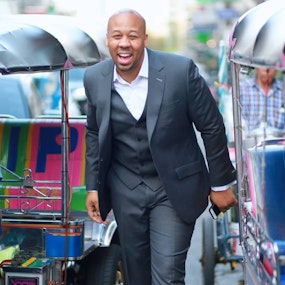
Erick Prince Minority Nomad
Photojournalist, Entrepreneur, and Content Creator
Erick Prince is a Bangkok-based writer, photographer, philanthropist, and world traveler on a quest to become the first African American to visit every country in the world.


























